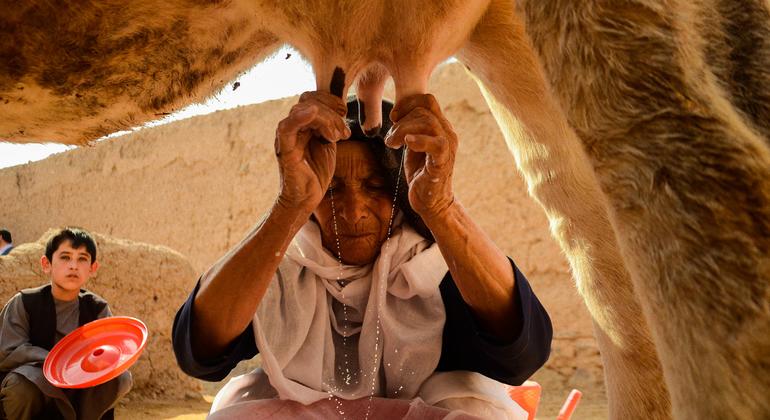Yes, that is why vegans supplement. There are certain nutrients you can't get from plants, like B12, retinol/provitamin A, heme iron. However comparatively expensive pharmaceutical supplements are not available in the poorest regions of the planet. So if people aren't eating animal foods and surviving entirely off of grains/staples like rice or maize meal if they get to eat at all, even if it is fortified, they will suffer from macronutrient deficiencies. Which is the point that the article is making.
If you live in a developed nation (and I guess most hexbear posters do) you don't need to worry about any of this, you're probably getting enough food in the first place, and if you're vegan you most likely already know about the necessary supplementation of nutrients like vitamin B12 and potentially others.
High quality protein, a number of essential fatty-acids - together with iron, calcium, zinc, selenium, Vitamin B12, choline and bioactive compounds like carnitine, creatine, taurine - are provided by foods from farm and other livestock animals, and have important health and developmental functions.
Iron and vitamin A are among the most common micronutrient deficiencies around the world, particularly in children and pregnant women, FAO notes.
More than one in two preschool children (some 372 million) and 1.2 billion women of child-bearing age, according to a study published in the Lancet, suffer from the lack of at least one of three micronutrients: iron, vitamin A or zinc.
Three quarters of these children live in South and East Asia, the Pacific and sub-Saharan Africa.
Did anyone bother to even read the article before resorting to cheap jokes? Malnutrition in developing countries is a serious issue. In my country 1 in 4 children experience stunted growth as a result of malnutrition. There's a reason Xi said China's greatest accomplishment was feeding 1.4 billion people and that the world should ask no more of them after that.
Another interesting part is the UN coming out against the bunk science of the 60s that stated saturated fats = bad for health in any context.
Meanwhile the evidence of any links between milk, eggs and poultry consumption in healthy adults and diseases such as coronary heart disease, strokes and hypertension is inconclusive (for milk) or non-significant (for eggs and poultry), said FAO
b12 is a sticky one, you can pretty much only get it from fortified foods
but you can get vitamin a from carrots, sweet potatoes, dried apricots, kale, cantaloupe, butternut squash, spinach, red peppers, papaya, tomatoesi've been vegan for 16 years and the only time i have taken supplements was when i was in prison, where they were provided to me
too expensive otherwiseYeah you can get vitamin A from plant foods, usually in beta carotene form. Though I think there are other forms of it as well. But the body must first convert this to retinol before using it. If you are eating enough food, this isn't really a problem for most people, but if you are at risk of starvation or anemic, it is an issue.
B12 can be obtained though food containing nutritional yeast like Marmite.
i feel that the stop starving people thing should come first before the animal agriculture is good actually thing
B12 can be obtained though food containing nutritional yeast like Marmite
yep, that's how i get mine
It's just B12. Which many corpse munchers are also very deficient in. It's not even present naturally in animal secretion and corpses, the victims are fed supplements instead of fortifying rice, plant milks and whatever
Rice is already fortified in most developing nations. But there are limits to what is possible. In terms of values here, most governments are targeting around 0.75-1.25 micrograms of vitamin B12 per kilogram of rice. That's about half the recommended daily amount. Fortified cereals usually fair much better with regards to B12 content.
Isn't there the one gmo rice that has some nutrient like this?
Yes, there is rice that is genetically modified, fortified, or both, to improve it's nutritional profile. Where I live, pretty much all the grains and staple foods you buy at the supermarket are fortified with nutrients to fight malnutrition.
But at the end of the day rice is rice, flour is flour and corn is corn. There is only so much that can be done. One of the limits of fortification of iron for instance, is that only non heme iron can be used in most cases. This is less absorbed by the body than heme iron. Not something most healthy people eating enough whole foods have to think about, but if a person is already eating too little food, stuff like that matters.
Lmao. These fucking goobers.
Most of India has been vegetarian for thousands of years. If meat was “essential”, they’d be dead.
Even most meat-eaters only eat it 1-2 times a week, if that. Very few people, throughout history, have consumed meat at levels anywhere close to what is considered acceptable in the world today. And in India eggs are a part of the “non-vegetarian” diet too.
I guess it’s literally just milk and milk products that are keeping 1.4 billion people alive by a thread. Just chugging gallons of cartons a day to get the “essential” nutrients.
India is not the best example to use here, 1 in 2 women are deficient in iron and 1 in 3 kids experience stunted growth as a result of malnutrition. It is why they are trying to fortify lots of foods like other countries have done to fight malnutrition. Sure people are surviving, but I wouldn't call the current situation great.
That's the whole point of this article by the UN, to look at malnutrition in developing countries like India and the potential causes.
India has very high levels of malnutrition among women and children. According to the Food Ministry, every second woman in the country is anaemic and every third child is stunted.
Fortification of food is considered to be one of the most suitable methods to combat malnutrition. Rice is one of India’s staple foods, consumed by about two-thirds of the population. Per capita rice consumption in India is 6.8 kg per month. Therefore, fortifying rice with micronutrients is an option to supplement the diet of the poor.
Yeah. No one is against fortification of food, here. India is suffering massively under its neoliberal government, which inherited the colonial-era policies of the British Raj. I can talk all day about the problems in India.
But there’s a reason I said “historically” and “thousands of years.” It was to show that you don’t need meat to live. People in India, before colonialism, lived just as well as people anywhere else without consuming huge amounts of meat.
The problems in India are not due to a lack of meat-consumption. It is due to colonialism and capitalism.
Before industrialisation but after the agricultural revolution people in general ate little meat.
Even hunter-gatherers mostly gathered, not hunted. Because hunting was risky but berries were not.
No human civilisation throughout history has ever consumed as much meat as modern Westerners, who now try to rationalise it by claiming its “essential”.
It’s not, and treating it as such, is already disastrous but is going to become catastrophic if pushed to countries like India and China (which you’re already succeeding at, so congrats I guess).
Hunter gatherers mostly gathered, we agree, and ate far less meat than modern westerners. It is still true that they at far more more meat than post-agricultural humans, which aren't a group that was a good model for diet.
I agree that meat consumption isn't necessary, and certainly not in quantity, but you will need additional supplementation. Without supplementation, a vegan diet is very difficult to make healthy. Your argument implied that wasn't true, which I took issue with.
As far as the increasing meat consumption in India and China, we both know that's not because they're convinced it's necessary for health, it's because people eat more meat as they get richer. Promoting alternatives is an active measure that their governments must take, and that will be unpopular to some degree.
but you will need additional supplementation
i haven't taken a supplement since 2012 because i can't afford them
i just eat food that has the nutrients i needModern Western diet is so disastrous for health (and environment) but no one points that out when saying “a vegan diet is very difficult to make healthy. “
No, rice and beans, staple of billions of people for thousands of years, is less healthy than the current diet most westerners follow, apparently.
Fwiw I’ve been vegan for going on 4 years, vegetarian for almost a decade and the only supplement I’ve ever taken is b12. In theory I could just eat a bunch of seaweed/shiitake/nooch but I’m lazy so I take the b12.
It was to show that you don’t need meat to live. People in India, before colonialism, lived just as well as people anywhere else without consuming huge amounts of meat.
I think there probably was a lot of malnutrition in India, as well as every other country, before the introduction of greater caloric and nutrient intake from modern farming. Yes humans can live without those but it significantly raises child and infant mortality, women's death rate, and generally unpleasant life. Meat and egg consumption did solve those problems to an extent, although it may not be sustainable. Regardless, I don't think we can just go back to that diet. A new one is needed.
Most of India has been vegetarian for thousands of years. If meat was “essential”, they’d be dead.
I don't know about "thousands of years" as in Vedic India meat was definitely consumed and animal sacrifices were performed for religious ceremonies:
In the time of the oldest Hindu sacred text, the Rig Veda (c. 1500 B.C.), cow meat was consumed. Like most cattle-breeding cultures, the Vedic Indians generally ate the castrated steers, but they would eat the female of the species during rituals or when welcoming a guest or a person of high status.
Ancient ritual texts known as Brahmanas (c. 900 B.C.) and other texts that taught religious duty (dharma), from the third century B.C., say that a bull or cow should be killed to be eaten when a guest arrives.
https://theconversation.com/hinduism-and-its-complicated-history-with-cows-and-people-who-eat-them-80586
Even in modern day India the number of pure vegetarians doesn't constitute the majority:
If you go by three large-scale government surveys, 23%-37% of Indians are estimated to be vegetarian. By itself this is nothing remarkably revelatory.
But new research by US-based anthropologist Balmurli Natrajan and India-based economist Suraj Jacob, points to a heap of evidence that even these are inflated estimations because of "cultural and political pressures". So people under-report eating meat - particularly beef - and over-report eating vegetarian food.
Taking all this into account, say the researchers, only about 20% of Indians are actually vegetarian - much lower than common claims and stereotypes suggest.
https://www.bbc.com/news/world-asia-india-43581122
Yeah, despite what Hindutva folks say, the Vedic religion isn’t modern Hinduism. For that you have to see the Bhakti movement but that’s a different point.
Conducting research like this is always very hard, but those numbers are hilariously wrong. But I’m not interested in debating over vegetarianism in Indian.
To go back to the main point, such data, even if taken at face value, always ignores the fact that most meat-eating Indians only consume a meat-based dish once a week or once a month. That percentage is rising with the newer generations but it’s still very low.
So if that little meat consumption is what is considered “essential” then the goal should be to tell Americans and Europeans, who can’t go one meal with it, to eat less meat.
But instead what you see (in India, China etc.) is meat being used almost as a status symbol. It’s the worst excesses of capitalism, that is literally unsustainable for the world, but is being excused and rationalised under the guise of “essential nutrients.”
It’s bullshit.
Conducting research like this is always very hard, but those numbers are hilariously wrong.
So what are the numbers then? All the sources I see place it below 50%.
Did you even read the next line I wrote or just popped off?
Yeah I get it, you don't want to debate. I don't either, I just want to know what the numbers are. You said that what I cited was "hilariously wrong" but then left it at that. Help me out a little.
Most estimates put it at around 40% (declining in recent years) with around 10% of those also eating eggs. That is important because it is considered vegetarian elsewhere but not exactly so in India so if you want to accurate in your research and not just provide clickbait headlines for the BBC, you will have to look into stuff and see what people actually mean when they say they are vegetarian or not.
As I said, research like this is hard and you can choose to not trust the government if you wish, but then going by some US anthropologist quoted by the fucking BBC is completely bonkers. It’s literally better to just talk to any Indians you know and form estimates that way, while acknowledging that the kinds of Indians who get to emigrate are the richer sort who are more likely to consume meat.
And, again, the vast majority of people who consume meat don’t do so every meal, every day or anything close to that. Just eating it a few times a month is enough to be considered a regular meat-eater which I don’t have a problem with as a category, but for this topic of meat being essential for nutrition, is so fucking dishonest.
As for the Vedic stuff, you can already see the change form that period to modern day religo-cultural habits by the 4th century:
Throughout the whole country the people do not kill any living creature, nor drink intoxicating liquor, nor eat onions or garlic. The only exception is that of the Chandalas. That is the name for those who are (held to be) wicked men, and live apart from others. ... In that country they do not keep pigs and fowls, and do not sell live cattle; in the markets there are no butchers’ shops and no dealers in intoxicating drink. In buying and selling commodities they use cowries. Only the Chandalas are fishermen and hunters, and sell flesh meat.
— Faxian, Chinese pilgrim to India (4th/5th century CE), A Record of Buddhistic Kingdoms (translated by James Legge)
That is important because it is considered vegetarian elsewhere but not exactly so in India so if you want to accurate in your research and not just provide clickbait headlines for the BBC, you will have to look into stuff and see what people actually mean when they say they are vegetarian or not.
As I said, research like this is hard and you can choose to not trust the government if you wish, but then going by some US anthropologist quoted by the fucking BBC is completely bonkers.
There was also an Indian economist in that study for what it's worth, which is why I thought it was at least somewhat credible. And like I said, based on other sources I've seen (you can find the references here: https://en.wikipedia.org/wiki/Vegetarianism_by_country#Estimates_and_Statistics) it's still below 50%, like I said. I was just curious.
i mean everyone eating meat is straight up unsustainable given how many people we have on Earth.
Everyone eating as much meat as your typical westoid is unsustainable. A more moderate consumption could be possible though.
yea I think eating a Chinese amount of meat is fairly sustainable. High pork consumption, low beef consumption.
Nope. The extra trophic levels make it inherently unsustainable
It's unsustainable, but more importantly here, it's entirely unnecessary. Meat, eggs, and milk are NOT essential sources of nutrients. You can get the same nutrient necessities from non-animal food sources and be healthier for it.
Yeah but this is one of those sticky subjects because of cultural issues and the basically nonstop history of human cuisine being intertwined with meat eating. As far as I know, no society has ever been vegan. There have been pockets of vegetarianism but nothing all the way vegan. The only solution I see is some kind of lab grown meat/milk/eggs. Then maybe in the future people can go vegetarian or vegan if they choose.
me not having eaten meat, eggs or milk in years:
just built different ig lmao :gigachad-hd:
You lack the nutrients necessary to comprehend the enormous size of a carnist’s brain power.
:frothingfash:: "The globalists are trying to push veganism to make you lose your aryan superpowers!"
The UN: "Please eat more meat, the private sector begs of you!"
“Sources of essential nutrients” =/= “essential sources of nutrients”
Before science it was. We have science now though. So if we wanted we could work around it easily.
^ first time i've seen anyone write this easy explanation
you could call everyone who eats meat a murderer or you could just say "you can eat it but it's not going to come from dead animals"
that would get literally everyone on board
no, just because "carnist brain" doesn't mean people don't hate animal cruelty, you just need to tell them everything will be fine, the nutrients in their diet won't changejust because “carnist brain” doesn’t mean people don’t hate animal cruelty
People who hate animal cruelty don't pay people to commit animal cruelty
I don't care what you find "nice and effective" if you're an animal abuser
I read through the pdf (I'm weird like that). I find it odd how the full article minimises deforestation and climate change, all the while over focusing on fixable nutritional issues. (like we can suppliment B12 and iron). The pdf devotes many pages quoting the limitations from studies confirming cardiovascular diseases in meat consumption, but takes quick and dirty takes from studies on veg diets without the same apology.
The ok health consequences of veg diets has been written about and confirmed in depth by many national health authorities. One thing I can't help notice is that (as far as I can tell), the authors are all agriculture experts and no one is in medicine. Many/most of them are connected to animal agriculture. See here and here.
No. See.
Eating meat is good for nutrients. If you try to argue against it, you’re being a gringo westerner who doesn’t care about poor people. There is no way to improve nutrition in the global south except by eating meat.
Climate Change? No no no, that’s not going to effect the global south at all because the meat will give them fucking superpowers.
carnists just want to eat burger
and if you tell them burger is bad then you're a fascist
We're relitigating the vegan struggle session let's gooooo :popcorn-time:










